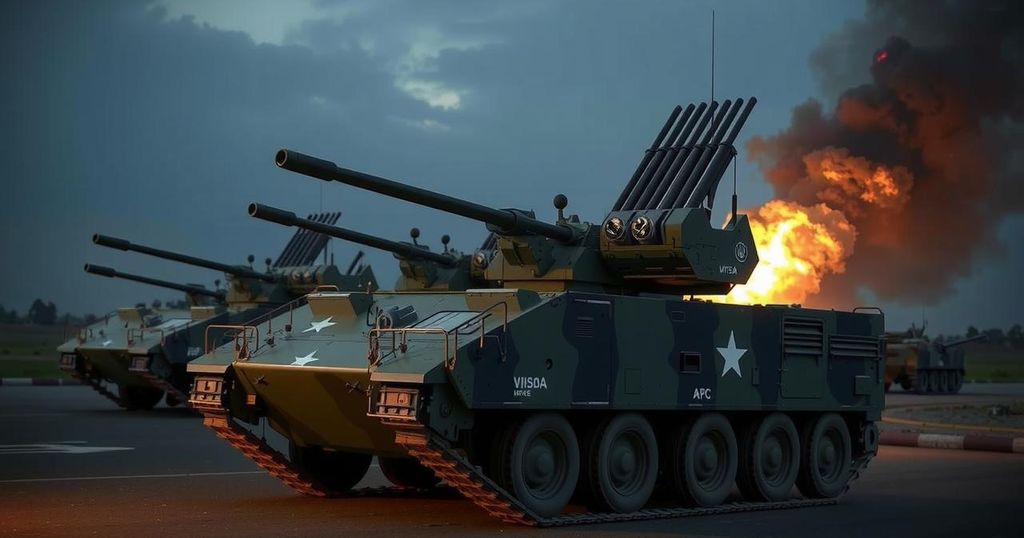Amnesty International Exposes Use of French Weaponry in Sudan, Breaching UN Arms Embargo
Amnesty International’s investigation reveals that French-made military technology is being used in armoured personnel carriers (APCs) in Sudan, potentially violating the UN arms embargo. The organization demands France halt the supply of these systems to the UAE and calls for a broader embargo on arms to Sudan, emphasizing the humanitarian implications of continued arms flow into the region.
Amnesty International has disclosed in a recent investigation that French military technology is being utilized in armoured personnel carriers (APCs) manufactured in the United Arab Emirates (UAE), which are currently deployed in Sudan’s ongoing conflict. This scenario potentially constitutes a violation of the United Nations’ arms embargo on Darfur due to the involvement of the Rapid Support Forces (RSF) in utilizing these APCs, which are equipped with the French-designed Galix reactive defense system. Photographic evidence corroborated by Amnesty International illustrates that several Nimr Ajban APCs, equipped with the Galix system, have been damaged or seized by the Sudanese Armed Forces (SAF). Amnesty International’s Secretary General, Agnès Callamard, stated that the presence of French weaponry in Sudan’s battlefield highlights the breach of the UN arms embargo. She emphasized that the ongoing arms flow into Sudan is exacerbating humanitarian suffering and called on all nations to halt military supplies to conflict parties in Sudan while urging France to cease supplying such defense systems to the UAE. Despite reaching out to French defense contractors and government representatives for comment regarding the Galix system’s use in Sudan, Amnesty International reported receiving no acknowledgment from these parties. France’s long-standing defense relationship with the UAE raises significant concerns, particularly as a parliamentary report indicates that French companies supplied military equipment valued at approximately EUR 2.6 billion to the UAE from 2014 to 2023. The European Union has enforced an arms embargo on Sudan since 1994, which prohibits any arms trade with the nation. France is obligated under various laws to refrain from arms exports if there exists a substantial risk that such equipment could contribute to severe human rights violations. Notably, the UAE has a documented history of disregarding UN arms embargoes in conflicts, including those in Libya and Sudan. Human rights due diligence throughout the arms supply chain is essential to prevent complicity in abuses, particularly in conflict-affected regions. Amnesty International, therefore, advocates for the expansion of the UN arms embargo on Darfur to encompass all of Sudan, alongside stronger enforcement and monitoring mechanisms.
The concerns raised by Amnesty International center on the allegations that French weaponry, specifically the Galix reactive defense system, is being deployed in Sudan despite existing arms embargoes. This situation highlights the complexities surrounding international arms trades, particularly in regions experiencing conflict and human rights abuses. The established relationship between French defense companies and the UAE raises serious ethical and legal questions, especially given the historical context of arms supplies to conflict-prone areas and the potential violations of international laws designed to protect civilians. The call for a broader arms embargo reflects a need for enhanced protection mechanisms in the region.
The findings of Amnesty International regarding the use of French military technology in Sudan underscore the urgent need for strict adherence to established arms embargoes. The involvement of the Galix defense system in the conflict illustrates the complexities and responsibilities of nations and companies in controlling arms sales, particularly in regions known for human rights violations. There is an implied necessity for greater international scrutiny and a reevaluation of existing arms export policies to ensure the protection of civilians in conflict-affected areas.
Original Source: www.dabangasudan.org




Post Comment